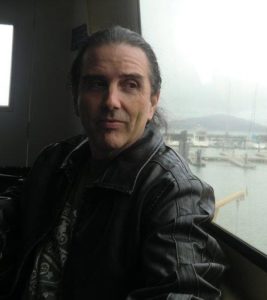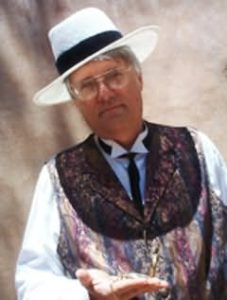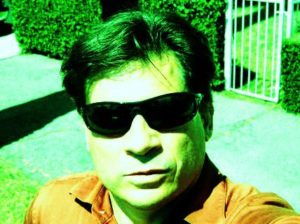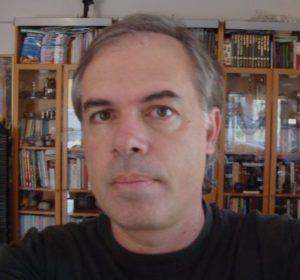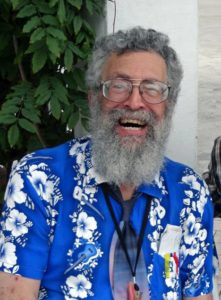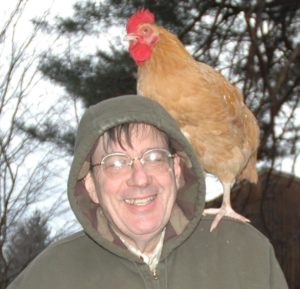Aug 23 2016
Interview with Patrick Hudson
Part of a series of interviews with the writers for the upcoming speculative fiction anthology, Clash of the Titles. the anthology is the brain child of Glen Bavel, who conceived of an endearing conceit: he provides a list of titles and the members of his Facebook workshop, Writing the Short (SF) Story, use it as a starting point for a short speculative fiction story.

“The Gearwheels of Heaven” is Patrick Hudson’s contribution to the upcoming SF anthology, Clash of the Titles. Patrick is a writer, and blogger who lives in London with his family. Recently, Patrick talked with me about his writing over the years, and his recent contribution to the anthology.
First, when did you decide you wanted to be a writer? How long have you been writing?
I probably started to think seriously about being a writer when I was 11 or 12, and wrote screeds of pointless derivative juvenalia. I had my first go at writing a novel when I was 25 and I’ve written a couple since then. About five years ago I decided to do an MA in creative writing, and graduated from Goldsmiths College in London.
I would say the last three-ish decades haven’t exactly been super productive, but I’ve kept plugging away. I’ve published about a dozen stories in various small press venues. I guess my biggest achievement was a getting third place equal in the Genomics Forum Short Fiction competition back in 2009 for my story ‘Original Mike’s Coffee Shop’. Third-equal is the lowest you can get and still win a prize!
Another story I’m proud of is ‘Insured… For Murder’ in Premonitions: Causes for Alarm, published back in 2008.
In 2011 I self-published my novel Panoptica through the amazon self-publishing program. That was my project when I did my MA and I’m really proud of that, too.
Over the last few years I’ve taken a break from prose to try my hand at stand up comedy. It’s good fun, and you get to come up with the cool ideas without having to worry about proof reading. I work with a writing partner and we’ve recently written a sitcom, too, so we’ll see if anything happens with that.
Why Speculative Fiction?
SF is just what comes out. I guess I’m interested in politics and philosophical ideas, and SF is a natural way to investigate those subjects.
So, who’s your favorite writer?
Oh, that’s a tricky one! I’m admirer of what you might call the sarcastic school of writing, Philip K Dick, William S Burroughs, Will Self and J G Ballard. Those are the sorts of books that make me think and laugh, although I think I’ve gotten a bit over familiar with it all now and have been trying to look at different types of thing to expand my parameters. I’ve been reading classics – Dickens and Kipling – in an effort to see things a bit differently.
My great comfort read, though, is Jack Vance. I’m just in awe of what he does. I could never do it myself, and my attempts to emulate it are generally awful, but he is just the funniest, cleverest, most brilliant writer that’s ever lived.
How did you find out about the anthology, Clash of the Titles?
I’ve known Gil for a while and he got in touch to see if I’d be interested in contributing.
What made you want to submit to it? Would you do it again?
Well, I’d been doing comedy for a while and felt like I should write a story again. I had a few ideas knocking around my head and thought picking a title would help me turn one into an actual story.
How did you come up with your story? What made you choose that title?
I’d been reading a bit about the holographic theory of the universe, and how it connected with Hans Moravec’s simulated reality hypothesis. It’s summarized in a really hilarious way by Nick Bostrom (and excuse me if I quote from Wikipedia here) who postulates that one of the following assertions must be true:
-
1. Human civilization is unlikely to reach a level of technological maturity capable of producing simulated realities, or such simulations are physically impossible to construct.
-
2. A comparable civilization reaching aforementioned technological status will likely not produce a significant number of simulated realities (one that might push the probable existence of digital entities beyond the probable number of “real” entities in a Universe) for any of a number of reasons, such as, diversion of computational processing power for other tasks, ethical considerations of holding entities captive in simulated realities, etc.
3. Any entities with our general set of experiences are almost certainly living in a simulation.
I just think that’s brilliant. If you start thinking about it it’s hard to resist coming to conclusion number 3! So I wanted to do the whole ‘What if…’ thing with the idea.
I was also reading a lot of early SF, which is frequently about crazed inventors making insane discoveries in their sheds. So I wanted to write a story that harked back to that really old idea of science as the province of these kind of wizardry mad scientists.
How is your story for the anthology the similar to your other works?
It’s sort of funny, which is generally what I do. There are a fewer jokes, though, and the humor’s a little more subtle. But it’s a black comedy, ultimately, which is what I tend to produce.
How is it different?
I think the golden age influence makes it a little less naturalistic than what I tend to write. There’s an element of pastiche in this, whereas I’ll usually try and be more real.
A lot has been said about the workshop process wherein the editor takes a video meeting with the writers to help offer instant feedback and share the editing process along the way. How did you find this process; what are your feelings about it?
Gil and I never got around to having a video conference, diaries being what they are and being on opposite sides of the globe. Gil was really helpful throughout, however, over email and messages.
What do you think is the most important thing that readers know about Clash of the Titles?
That it’s a great anthology of amazing stories. The interesting way the stories have been generated doesn’t matter in the end – it’ll stand or fall on the quality of the work.
It’s said that the editor will make an anthology every year. Even if the “I pick the titles, you write the story” conceit isn’t used again, would you work with the editor again?
Yeah, definitely. Gil’s a good egg.
What do you think is the most important thing for booksellers, libraries and other outlets to know about Clash of the Titles that they don’t know?
New and existing SF talent sitting cheek by jowl. Excellent stories from writers at all levels of their career. As I say, it’s all about it being a great read!
Would you recommend the process to other writers; how did you find working with this editor to be compared to others?
I would definitely recommend it. I think Gil knows when to intervene and when to step back, so he’s happy
What excites you most about the process, and the anthology in general?
Choosing the title and riffing off that was the best thing. It gave a slightly formless idea a bit of purchase and helped me get started on it.
Did your story grow in ways you didn’t expect due to the workshop nature of the process? How?
Hmm, not really! The final story is more or less as it came out, with a bit of fiddling in the details.
Please describe your favorite experience in working with Clash of the Titles.
Just working on fiction again.
What other projects are you working on, besides Clash of the Titles?
Right now I’m working up some ideas for more stand-up. I’m also working on a novella featuring the main character from ‘Insured…. For Murder’ that I’ll probably serialize on the web. We’ll see how it goes!
You can visit Patrick Hudson’s site and blog here.
